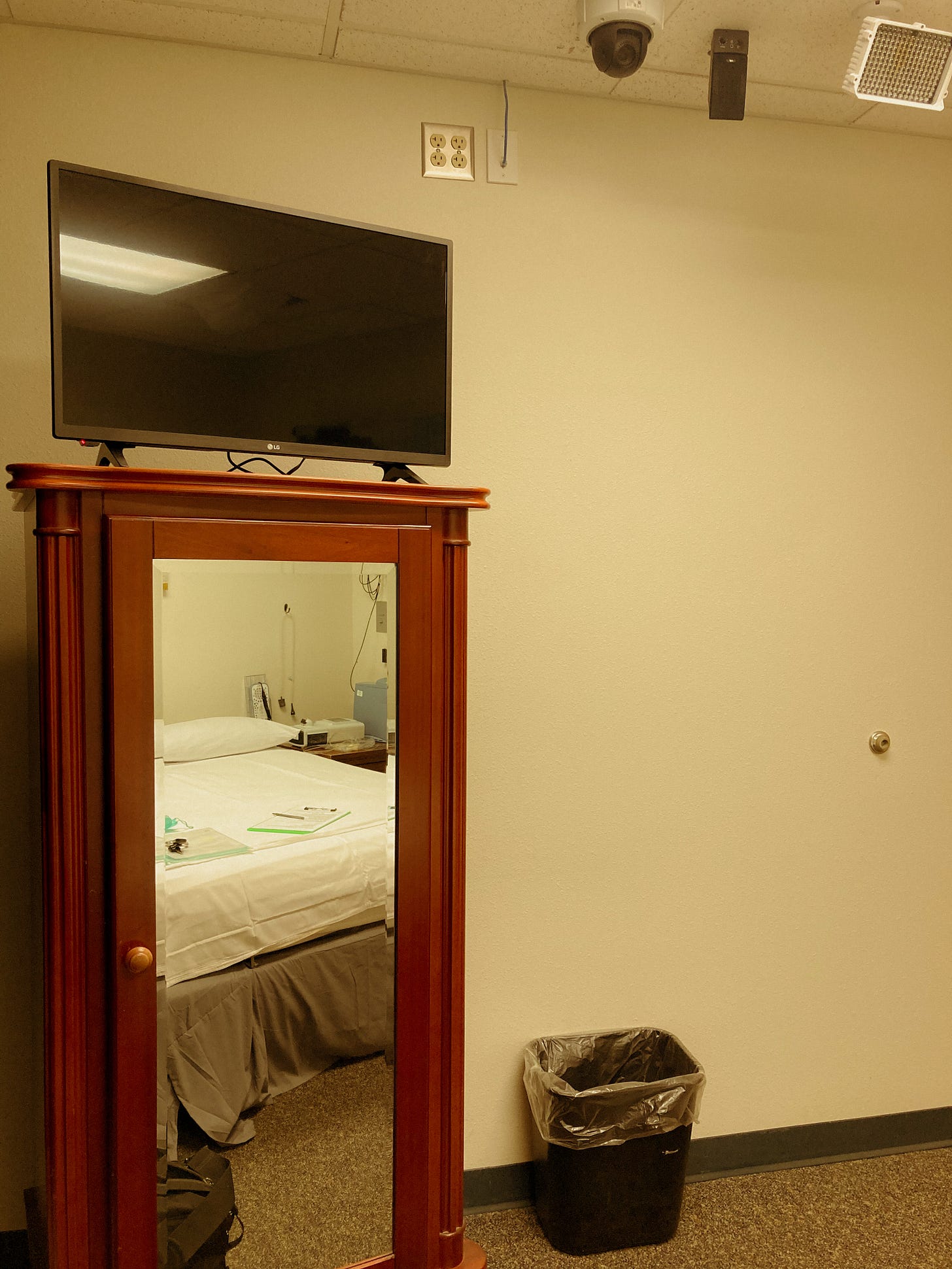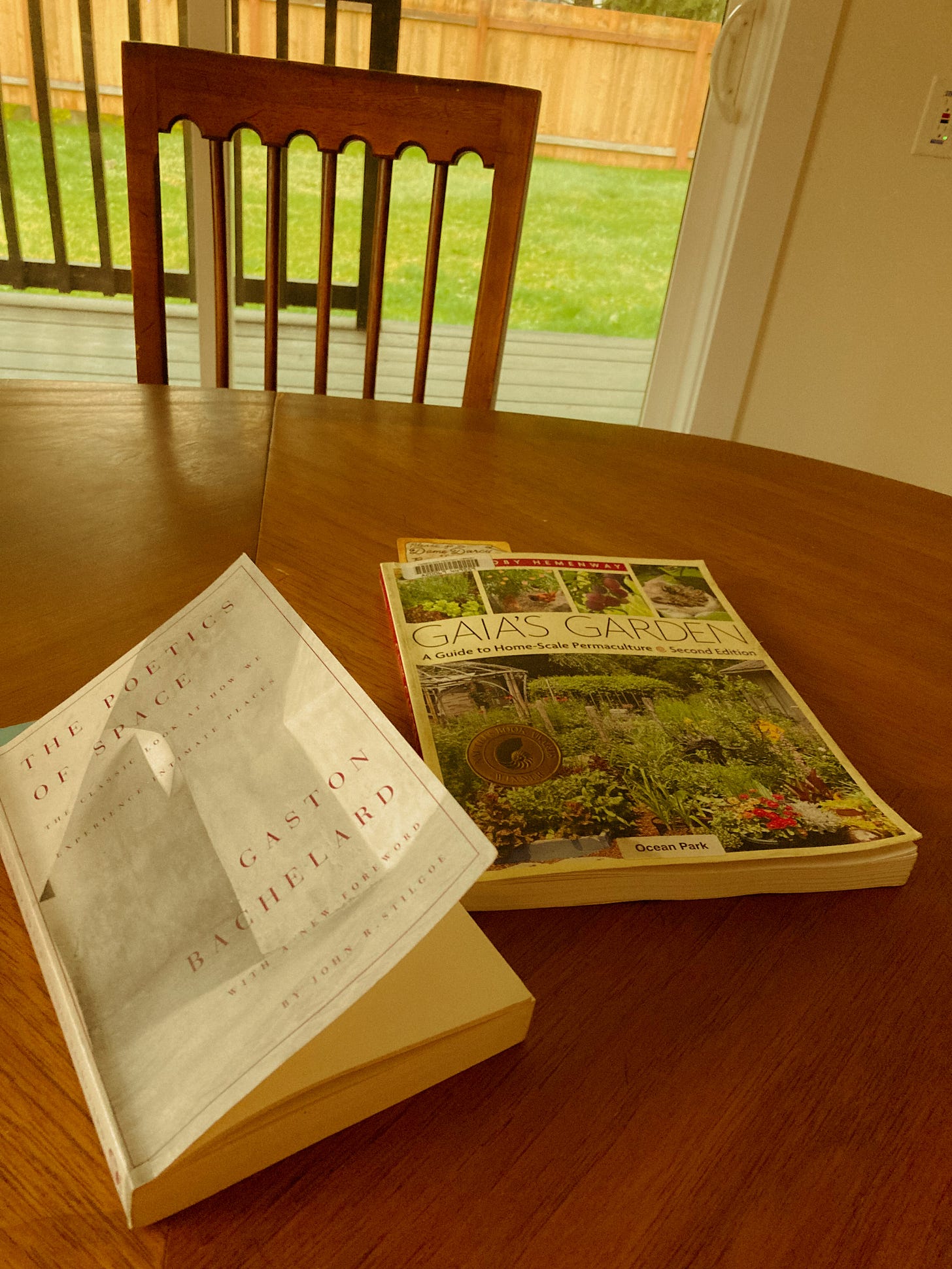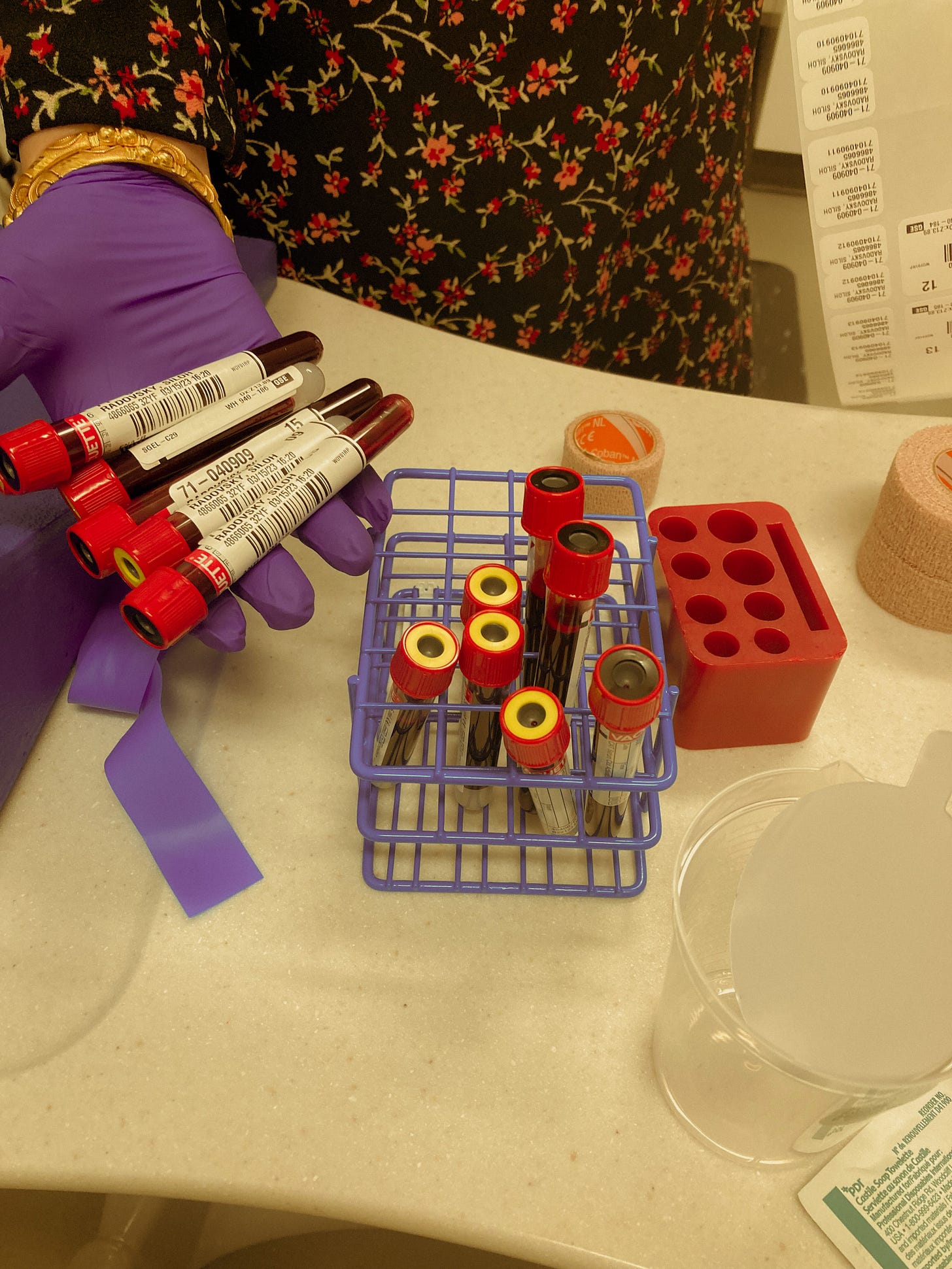Snip one thread
On being too tired to write
For the month of March, a string of "x's." Each one marks a day hazy with fatigue, often a byproduct of insomnia. I've lately been waking up at 4 or even 1 AM, kept awake by physical restlessness, heart pounding with no concurrent anxiety to explain it. On those days, I move through my day job a shell rinsed out by my own inability to rest. Other days, after a full night of sleep, my lethargy illustrates insomnia's residue, the sleep debt I've been steadily gathering for months.
A disconcerting heart fluttered is new on the symptom roster, an occasional motorboat in my chest. Like my insomnia, this symptom isn't new but its new intensity has reached medical proportion. Also new (or new-ish): my fingers, red, puffed, and tender. They look like somebody else's hands, ancient and arthritic. And my fatigue is back, too. Now I have what feels like a part-time job calling my insurance company and scheduling appointments with various specialists.
An unexpected suggestion seemed to finally explain this constellation of symptoms: sleep apnea. My heart palpitations, trouble staying asleep, late-night vigilance, and episodes of waking up gasping for breath were suddenly useful puzzle pieces in the symptom landscape. A diagnosis of sleep apnea could finally resolve the familiar, heavy drag of exhaustion.
At the beginning of this month, I showed up to a sleep clinic with a pillow tucked under my arm. In the off-hours, the medical pavilion was eerily empty, lit dim and yellow. A stern security guard with a machine gun tattoo on his forearm let me in. The room where I slept (or tried to) was an office masquerading as a motel. The polysomnograph technician expertly applied nodes to my scalp, face, chest, and legs while we chatted about, among other things, her growing disinterest in her job. After the data was collected, she woke me up and I retraced my steps through the building, bleary eye, stepping out into the cold, dark morning. I'd wait three weeks for the results—a long time, but not so bad if it was the tail end of a long-lasting saga.
From inside the saga of my fatigue, finishing anything seems heroic, like it's a key change I can't reach. Exhaustion makes the world lurid and surreal, a rude imposition I have to keep up with. Sometimes chores feel heavy to grasp but at least sweeping and putting the dishes away is tangible. When I am the most tired, writing feels out of the question. It requires conceptualizing and believing in something I can't see yet, a belief that itself becomes tender and painful to confront.
It's embarrassing to talk so much about writing (like in these letters) and to have done so little of it these past few months. Instead, what I have been able to do is read books about gardening and the Burnt Ridge Nursery catalog. I've only ever had haphazard gardens, overzealous plots created just in time for the growing season. The sporadic results have also embarrassed me, mirroring my urge to make things work before they're ready. But this year, our first spring at our new place in Shelton, something feels different. It feels possible, finally, to learn about building up the soil and cultivating something which can stay alive on its own.
My friend V recommended One Straw Revolution by Masanobu Fukuoka (which I have yet to track down) and Gaia's Garden by Toby Hemenway, which I got from the library and have been reading in the evening. There'd be more to say about the ideological/political dynamics surrounding permaculture (which are reflected in Gaia's Garden) but the book is more or less blowing my mind about gardening, which is also blowing my mind about writing.
The long essay I was working on most recently, paused while only half-finished, had "nets" as an overarching motif. This theme (appropriately) connected the essay’s disparate threads: threadbare social safety nets, the sneaky traps laid by Trickster figures like Hermes, punk optimism as trickery and delusion, the family constellation of which I am inevitably a part of, along with other networks I inhabit (and have tried to escape).
The net has also been a helpful shape against which to compare the essay as a form, where various nodes of story and idea form junctures with each other, tailored to the essay's own idiosyncratic inquiry. The network or weaving analogy has felt enabling, but the other night, lying belly-down in be over Gaia's Garden, I found a passage which highlighted the anxiety still present in my approach to this shape:
Each organism is connected to many others. It's this interconnectedness that gives nature strength. Think of a net or a web: snip one thread, and the net still functions because all the other connections are holding it together.
I've worried that when I return to my essay, I'll find its structure tenuous, held together with filaments or pocked with absence. But a truly ecological approach to a book or an essay would be less architectural, less concerned with a quantifiable scaffold. I felt in that moment the possibility of creating a work which keeps itself alive, vibrant and sturdy with abundance, even if its parts were cultivated "out of order." I realized I'd been treating my book a bit like an annual garden which required intensive cultivation in linear raised beds, and instead saw another way forward: a true network in which each part reinforces the whole, resilient to absence.
Yet I'm wary of the "getting better all the time" sentiment when it comes to navigating the murky ongoingness of a writing project, and also around chronic illness—wary of saying that I finally know my way through now, which I worry the newsletter format encourages. It's disheartening to project a narrative arc which can never fully arrive, and disappointing to organize myself around a causal force which turns out to have been illusory. But I'm not opposed to looking for a storyline (or the lines that form a web of stories). So how to engage the threads of story without overdetermining an end-point?
Last Friday, a week ago, I had my finally had my follow-up from the sleep clinic. In an underwhelming exam room, the doctor came in with a thin slip of papers, sat down, and told me I did not have sleep apnea. Afterwards, I went and cried in the parking lot of the nearby mall, a real tearjerker of a place. The good news—not having sleep apnea—was cause for despair because it meant there was not a clearcut cause or solution for my exhaustion, and I spent the next 16 hours tinged with rage and exasperation at the medical casualness around my struggle to sleep. Conveniently, I had my first therapy appointment in months the following morning. I described my medical misadventures to my therapist, gearing up to vent about medical gaslighting when he suggested that, given the breadth and medical opacity of my symptoms, it might be helpful to explore what's going on through the lens of embodied emotions, at least until scientific medicine gives me something to work with. That even the physiological vigilance and seemingly mechanical problem which has resulted in my insomnia—the gasping and heart flutter—could be adaptive strategies secreted away in my organs and tissues.
I have about a gajillion things to say about both the possibilities and problems of narrative readings of the body, many of which I have already written, tucked away in more and less messy drafts of the book I've lately been too tired to work on. (So much to say, too, about the ways that our stories twine with our material realities, both in the molecular and structural sense.) But I haven’t really engaged with my own symptoms through this lens, and especially not in any kind of structured, supported way. After my first medical diagnosis (with hypothyroidism, in 2016), I more or less vowed to not engage with my symptoms metaphorically. It felt too slippery and dangerous; I'd already once been misled in reading my fatigue as something I could just emote my way out of. But this time, extensive lab work hasn't revealed much. Instead, it's felt like bringing the puzzle pieces to specialists who touch them lightly, then move on. While it was probably the responsible thing to investigate them medically, it felt revelatory to remember I can be the narrator of this story, too—that the analytical and deductive work of figuring out what’s going on also takes place in a plane I have access to: the realm of story, thought, and feeling.
That afternoon, after my appointment, I found my own kind of lightness through fatigue, a symptom which felt suddenly more malleable, something I can read, know, and change. I went outside and dug holes for the two Elderberry bushes I've been waiting to get into the ground, feeding compost and mycorrhizal fungi to their roots.
I don't know if this week marks the turning point in the story of my symptoms, and I don't know when I'll have the energy to be in the swing of my writing practice the way I crave. (I also don't know whether a new puzzle piece will emerge, locating my ailments solidly within the medical paradigm.) But there is heartening clarity in the two concepts I am coming to know more intimately: the interconnected abundance of a network, and the prospect of listening to the story body is telling me. The conjoined timing of this new intimacy with familiar topics feels itself significant and synergistic. I'm being inconvenienced by my body—and forced to pay attention to my tangible form—instead of just writing about (or around) it; I'm also learning how to take care of a patch of earth not just for a season, but for years ahead. "The efficiency of inefficiency" keeps coming to mind: what I'm being invited/forced to understand.
There's the tangible form of my body to tend to, but also the things this form hides and stores. The relationship between writing and my own health is throbbing. It's been a clot, an inconvenience—my body standing in the way of writing—but things need to travel in both directions here. What's been held below the surface is both sickening and fertile, and it's a good time to bring it above ground and see what it all might have to do with each other.
Culture list
A short list of things I’ve recently read, watched, or listened to that have nourished my thinking, imagination, or both!
The Meat and Spirit Plan by Selah Saterstrom: I've long been a huge fan of Selah (and have been lucky to study with her through Four Queens—which I also highly recommend!), but somehow hadn't ever read her fiction. This book sucked me in and delighted me with its sentences, story, and structure.
“Crunching on Banking: SVB and Risky Business,” a recent episode of Bottom Lines Top Dollars: It was refreshing to hear this anti-capitalist, financially-literate take on the whole wobbly bank scenario.
The Poetics of Space by Gaston Bachelard: I’m cheating here because I haven’t finished this yet. It’s taken me about a month to make it past the intro—not because it wasn’t interesting, but it’s just been that kind of month. I’ll admit this is on the denser, chewier side than what I’ve lately been enjoying, but this book is genuinely one of the weirdest, most intimate bites of theory I’ve encountered. I’m enjoying approaching domestic space from its heartfelt angle. Thank you to my friend Wambui for reassuring me that even its density is basically poetry.
Offerings
Writing in Unknown Shapes — A course for ambitious writers working in ambiguous forms. Enrollment is currently closed, but I’m beginning to stir things back to life. If all goes accordingly, I will be announcing open enrollment later this spring.
Experimental Practice podcast — Conversations about cross-genre and interdisciplinary work, culture, writing craft, and creative practice
Practice Space — Drop-in guided writing sessions — On hiatus while I sort out my health/energy, but I look forward to writing with you again soon!
Follow me on Instagram — I’m there sometimes!
Read more Essence of Toast — Archive of past letters




